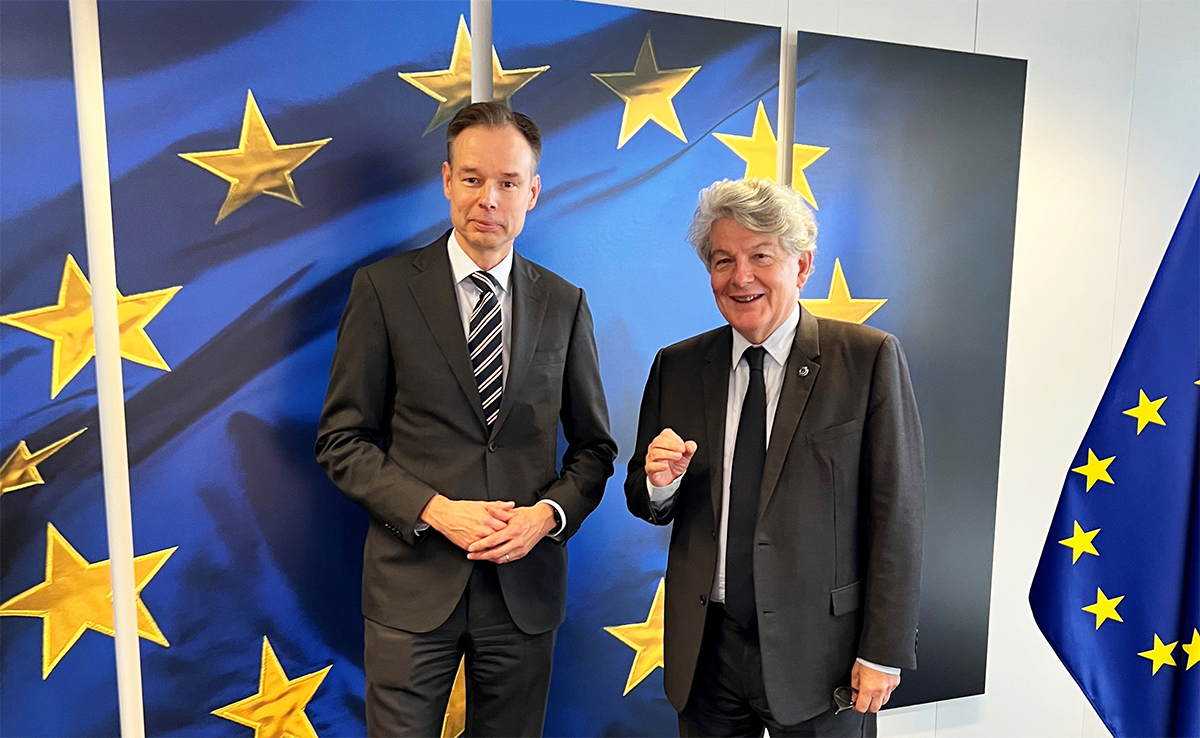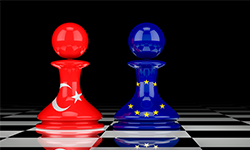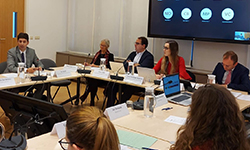BusinessEurope Headlines No. 2022-32
Discussion with Commissioner Breton: urgent need to tackle the energy crisis

On 20 October, BusinessEurope President Fredrik Persson and Director General Markus J. Beyrer exchanged views with the European Commissioner for Internal Market, Thierry Breton, on the current energy crisis. Companies of all sizes across Europe are facing the prospect of an extremely challenging winter. President Persson informed Commissioner Breton that the situation was deteriorating fast, as fixed price energy contracts phase out gradually. Many energy-intensive companies are considering to or have already reduced their production. For instance, 70% of fertiliser making capacity and 50% of aluminium production have shut down in Europe. For BusinessEurope, the EU therefore needs to urgently find ways to mitigate the impact of crippling energy prices. Well-designed emergency measures must be implemented on a strict temporary basis, closely monitored, and adjusted if necessary. BusinessEurope is urging the EU to decouple gas prices from electricity prices. This measure should be flanked by other ambitious policies, such as a new temporary crisis framework scheme that would allow to allocate much-needed aid more efficiently to affected businesses, as well as the diversification of external energy suppliers.
Contact: Nathan Munch
Trade and investment are key to support the EU's economic strength
 "The EU needs to stand firm in defending its economic interests in the face of increasing geopolitical turmoil and instability", said Luisa Santos, Deputy Director General of BusinessEurope, during the Annual Economic Forum of the Lithuanian Confederation of Industrialists (LPK) on 20 October. She added that we need to urgently address energy costs that risk undermining the EU's global competitiveness and attractiveness as an investment location, and we need more trade and investment opportunities to support our economic growth. "The EU's international strength comes from its economic power, and trade and investment agreements are key to preserve it", she highlighted. "In an economic and geopolitical context clouded by uncertainty, unilateralism and protectionism, the EU needs to continue engaging with trading partners, promoting rules-based trade and closer economic and political ties", Santos concluded.
"The EU needs to stand firm in defending its economic interests in the face of increasing geopolitical turmoil and instability", said Luisa Santos, Deputy Director General of BusinessEurope, during the Annual Economic Forum of the Lithuanian Confederation of Industrialists (LPK) on 20 October. She added that we need to urgently address energy costs that risk undermining the EU's global competitiveness and attractiveness as an investment location, and we need more trade and investment opportunities to support our economic growth. "The EU's international strength comes from its economic power, and trade and investment agreements are key to preserve it", she highlighted. "In an economic and geopolitical context clouded by uncertainty, unilateralism and protectionism, the EU needs to continue engaging with trading partners, promoting rules-based trade and closer economic and political ties", Santos concluded.
Contact: Luisa Santos
EU-Turkey Business Dialogue: a catalyst for stronger bilateral relations
 "The unprecedented circumstances we are facing mean that we cannot operate under a business-as-usual format. However, this can also be used as an opportunity to deepen relationships with our friends, such as Turkey", Luisa Santos, Deputy Director General of BusinessEurope, said at the EU-Turkey High Level Business Dialogue on 26 October. "In this regard, we have to stick to the principles of deep economic integration, respect of the rule of law and a rules-based trade", she added. The event was organised under the project "Turkey-EU Business Dialogue" that is co-funded by the EU and the Republic of Turkey, and took place in hybrid format with the participation of political and business leaders. Santos participated in a discussion on "How can EU-Turkey Economic and Trade Relations be improved, taking into account the Changing Geopolitical Environment, Global Value Chains and the EU Green Deal?". BusinessEurope supports the modernisation of the EU-Turkey Customs Union Agreement, which shall include a functioning dispute settlement mechanism, as well as take into account the green and digital transformation processes. Regarding the Green Deal in particular, the EU and Turkey should work together to ensure that the industry is up to the challenge and able to meet the objectives.
"The unprecedented circumstances we are facing mean that we cannot operate under a business-as-usual format. However, this can also be used as an opportunity to deepen relationships with our friends, such as Turkey", Luisa Santos, Deputy Director General of BusinessEurope, said at the EU-Turkey High Level Business Dialogue on 26 October. "In this regard, we have to stick to the principles of deep economic integration, respect of the rule of law and a rules-based trade", she added. The event was organised under the project "Turkey-EU Business Dialogue" that is co-funded by the EU and the Republic of Turkey, and took place in hybrid format with the participation of political and business leaders. Santos participated in a discussion on "How can EU-Turkey Economic and Trade Relations be improved, taking into account the Changing Geopolitical Environment, Global Value Chains and the EU Green Deal?". BusinessEurope supports the modernisation of the EU-Turkey Customs Union Agreement, which shall include a functioning dispute settlement mechanism, as well as take into account the green and digital transformation processes. Regarding the Green Deal in particular, the EU and Turkey should work together to ensure that the industry is up to the challenge and able to meet the objectives.
Contact: Sofia Bournou
Stronger role of EU Competitiveness Council expected
 On 20 October, BusinessEurope Internal Market Policy Committee (IMCO) met and exchanged views with the Czech Presidency of the Council of the EU on pressing issues related to the Single Market and measures necessary to support competitiveness in Europe. With tensions constantly building up on companies due to the energy crisis, post-pandemic recovery challenges and additional regulatory requirements coming with the new EU proposals, there was a widely shared sentiment that jobs and competitiveness of the EU are seriously jeopardised. Members of the committee stressed that the flow of new regulations from the European Commission, putting additional costs on industry, was just "business as usual" that could not be justified in the present crisis, which will already have lasting effects. They also shared their views that the EU Competitiveness Council should play a much stronger role in raising such concerns and standing firm to protect the competitiveness of our businesses. The EU Council should not simply follow the pressures of legislative priorities of the Commission but also have its political assessment and decisions when it comes to the impact on competitiveness of those priorities. In addition, committee members also heard a Commission representative on the proposal for a Single Market Emergency Instrument (SMEI), published on 19 September, and raised many significant questions on its scope and level of intervention.
On 20 October, BusinessEurope Internal Market Policy Committee (IMCO) met and exchanged views with the Czech Presidency of the Council of the EU on pressing issues related to the Single Market and measures necessary to support competitiveness in Europe. With tensions constantly building up on companies due to the energy crisis, post-pandemic recovery challenges and additional regulatory requirements coming with the new EU proposals, there was a widely shared sentiment that jobs and competitiveness of the EU are seriously jeopardised. Members of the committee stressed that the flow of new regulations from the European Commission, putting additional costs on industry, was just "business as usual" that could not be justified in the present crisis, which will already have lasting effects. They also shared their views that the EU Competitiveness Council should play a much stronger role in raising such concerns and standing firm to protect the competitiveness of our businesses. The EU Council should not simply follow the pressures of legislative priorities of the Commission but also have its political assessment and decisions when it comes to the impact on competitiveness of those priorities. In addition, committee members also heard a Commission representative on the proposal for a Single Market Emergency Instrument (SMEI), published on 19 September, and raised many significant questions on its scope and level of intervention.
Contact: Martynas Barysas
EU Sustainable Finance Framework: what it needs to succeed
 "The EU Sustainable Finance Framework is essential to reach the objectives of the EU Green Deal", Carolina Vigo, Adviser for Sustainable Finance, clarified at the roundtable "The matrix: sustainable reporting requirements" organised by the European Roundtable on Climate Change and Sustainable Transition (ERCST) on 26 October. She stated that the EU framework clearly aims at supporting investors-investees relations, and this attracts investments. However, she warned that the framework should not become its own enemy, merely raising anxieties due to the unclear reporting requirements. There are two solutions to avoid this risk: firstly, the European Commission should address interpretative questions that are raising from the Taxonomy Delegated Acts; secondly, companies need incentives to transition. "Companies need a comprehensive framework which connects industrial strategy, reporting, and corporate governance, and which rewards business efforts", Vigo concluded.
"The EU Sustainable Finance Framework is essential to reach the objectives of the EU Green Deal", Carolina Vigo, Adviser for Sustainable Finance, clarified at the roundtable "The matrix: sustainable reporting requirements" organised by the European Roundtable on Climate Change and Sustainable Transition (ERCST) on 26 October. She stated that the EU framework clearly aims at supporting investors-investees relations, and this attracts investments. However, she warned that the framework should not become its own enemy, merely raising anxieties due to the unclear reporting requirements. There are two solutions to avoid this risk: firstly, the European Commission should address interpretative questions that are raising from the Taxonomy Delegated Acts; secondly, companies need incentives to transition. "Companies need a comprehensive framework which connects industrial strategy, reporting, and corporate governance, and which rewards business efforts", Vigo concluded.
Contact: Carolina Vigo
Debating the logic of trade restrictions and embargoes
 Speaking about the logic of trade restrictions and embargoes from a Brussels perspective at the event "The Double Helix of International Markets" on 25 October, Sofia Bournou, Senior Adviser at BusinessEurope’s International Relations department, argued that "over the past years, measures such as sanctions and export controls have proliferated and have become more complex". It is critical for businesses, she added, to understand them in order to be able to comply, and at BusinessEurope, together with our members, we try to help companies navigate this complex legal framework. The event was co-organised by our Italian member Confindustria and the Italian Trade Agency (ITA), and it was part of a series of webinars that aimed at informing companies about the latest developments on trade policy and technical issues. Bournou highlighted that European businesses require additional guidance from the European and national authorities to be provided as soon as possible, as well as closer consultations and engagement with stakeholders throughout the legislative process to understand the impact of these measures. Better coordination with allies, involving as many global partners as possible, is also key to address the risk of circumvention.
Speaking about the logic of trade restrictions and embargoes from a Brussels perspective at the event "The Double Helix of International Markets" on 25 October, Sofia Bournou, Senior Adviser at BusinessEurope’s International Relations department, argued that "over the past years, measures such as sanctions and export controls have proliferated and have become more complex". It is critical for businesses, she added, to understand them in order to be able to comply, and at BusinessEurope, together with our members, we try to help companies navigate this complex legal framework. The event was co-organised by our Italian member Confindustria and the Italian Trade Agency (ITA), and it was part of a series of webinars that aimed at informing companies about the latest developments on trade policy and technical issues. Bournou highlighted that European businesses require additional guidance from the European and national authorities to be provided as soon as possible, as well as closer consultations and engagement with stakeholders throughout the legislative process to understand the impact of these measures. Better coordination with allies, involving as many global partners as possible, is also key to address the risk of circumvention.
Contact: Sofia Bournou
Calendar 
- 7-18 November: United Nations Climate Change Conference 2022 (UNFCCC COP 27)
- 15-16 November: G20 Bali Summit
- 16-17 November: European Business Summit
- 17 November: The Unitary Patent system – a game-changer for innovation in Europe
Not yet a subscriber? Register here.
Reminder: please have a look at our privacy policy